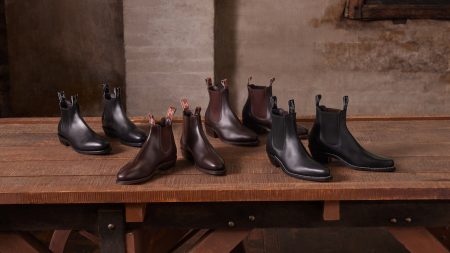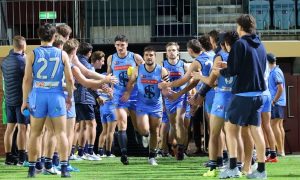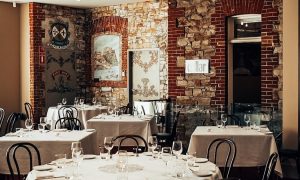Presented by State Opera of South Australia and Victorian Opera
Reviewed 7 May 2022
In 1977 Peter Hemmings, the then General Manager of Opera Australia, commissioned Richard Meale to write an opera based on Patrick White’s epic novel Voss. David Malouf undertook the challenge of creating the libretto from this magnificent book created by the genius of Patrick White, based on the life of the explorer Ludwig Leichardt, who famously disappeared on an expedition into the Australian outback.
It took almost ten years, from 1977 to 1986, to get this magnificent Australian opera from the page to the stage. It has not been seen in Australia since 1990 and has taken over 30 years for it to return to the stage. It was scheduled to be seen in Adelaide last year after a performance in Melbourne, but our new companion Covid made us wait even longer to see it. Was it worth the wait? Without a shadow of a doubt, it was!
It is opera on a grand scale. It feels like Richard Meale channelled Puccini and Wagner and collaborated with Britten to bring about something that assaults and enlivens our senses. It is a story that engages our imaginations. It’s a love story, a saga of love and determination to overcome all obstacles that stand between love and salvation; it’s a misunderstanding of the power of the Aboriginal guardians of the land we live, lived through Meale’s glorious music and an epic poem by Malouf based on White’s mammoth book about exploring a country that calls you, but gives you no understanding of the power it generates and the consequences of having a spiritual and intuitive connection with another soul on a level that has no explanation. It’s a musical experience of sensations and ideas that wraps you up and takes you on a journey to another place in your spiritual connection to music.
And that’s just what I got from it!
It was a night of outstanding performances. Samuel Dundas’ Voss was rich and enigmatic, a performance driven by an internal connection that forced us to follow a journey driven by an unquenchable connection to a pathway of discovery which had provided one fatal outcome. His voice was a rich and secure vehicle on which to base his storytelling. Laura, played with exquisite joy and pain, by Emma Pearson, was a study in the connection of two spirits that have no choice in the intertwining of their hearts and minds. Her vocal intensity was heartfelt and in tune with the psychic and physical requirements of the character. A performance full of nuance and vitality of spirit driven by an enchanting voice. Pelham Andrews’ masterful portrayals of the rich benefactor Mr Bonner, and the raw ex-convict Judd, was excellent. His vocal clarity and masterful acting ability made his two characters shine and was ably matched by the talent and rich voice of Cherie Boogaart as Mrs Bonner and Mrs Judd. The opening evening party scene hosted by the Bonners was so well staged the Adelaide Symphony Orchestra sitting behind the performance area just melted into the background.
The performances of Nicholas Jones (Harry Robarts) Michael Petruccelli (Frank Le Mesurier) and Joshua Rowe (Palfreyman) were strong and powerful both vocally and theatrically, adding a dimension to the story that brought passion and apprehension in equal measure to the storytelling. Trevor Jamison (Dugald) and Elijah Valadian (Jacky) underpinned the First Nations connection to the wide brown land we live in and their mystical and powerful presence reminded us that the power of these guardians of our land has frequently been underestimated. Voss’s band of brave followers brought some really outstanding energy to the storytelling.
Jessica Dean was a suitably neurotic Belle Bonner with a glorious vocal quality let down by some articulation. It was very hard to discern the words from the tone at times. Mark Oates (Lt Tom Radcliffe) displayed his always-reliable voice coupled with some very fancy dance moves to bring his character to life with care and focus. Jiacheng Ding (Mr Topp) was a welcome moment of light relief and Jeremy Tatchell (a reporter) and Rachel McCall (Rose Portion/Mercy) did a very commendable job of their small but vital roles.
Stuart Maunder’s exquisitely simple staging to the backdrop of some iconic slides of paintings by Fred Williams and a full Adelaide Symphony Orchestra, was enhanced by Roger Kirk’s simple but elegant design. The costumes for the principals were authentic 1840’s and the choice to clothe the chorus in simple black added a dimension and at times a darkness that added to the power of the delivery of the story.
Richard Mills’ promise to Meale to get it back to the stage, and Mills’ collaboration with Stuart Maunder, who has directed this inspired musical landscape of an opera, has gifted us the chance to experience this uniquely Australian opera again. Mills’ interpretation of Meale’s score and his subtle and intuitive guidance of the singers and the ASO was an act of pure love for the observer.
At its heart it is a love story. But not just about two people, but also about a love of the land and the spirit that is present through the indigenous connection to that spirit and its place in the hearts of the Australian people. We have been gifted a great deal by the oldest living culture still living on the planet, with whom we share this vast continent. And these twentieth century values sit under the story and gives depth to the spiritual connection between Voss and Laura.
This epic opera, if produced under normal circumstances, would have been staged at enormous expense with sets and costumes to suit the grand sweep of the narrative. The opera we were treated to at the Festival Theatre benefitted greatly from its need to be staged simply. With just the bare bones of production we were given the permission to enjoy this glorious work uncluttered. What a brave and intelligent choice.
Please don’t make us wait 30 years to see it again.
Reviewed by Adrian Barnes
One Night Only – Season Ended
Stars out of 5: 5




















